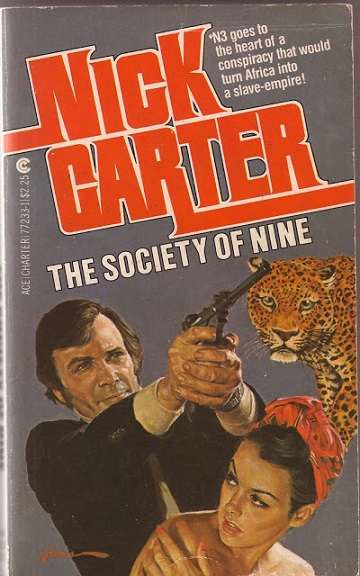Book Review: The Society of Nine by Nick Carter
Nick Carter, Killmaster-ranked agent of AXE, is called away from one of his rare days off when it’s discovered that a recently deceased assassin is a near dead ringer for him. The plan is for Nick to disguise himself as Anglo-Irish sniper Liam McDaniel and meet the man’s contact in Algiers to find out who his target is–and why. In Algiers “Liam” meets very light-skinned black woman Robin Brenton, but is able to get little information before they’re both attacked by KGB agents.

A clue on the dead attackers leads Nick to a rendezvous between another African woman and the thinly disguised top Soviet agent Berenko. The latter seems genuinely baffled by “Liam” barging in on the assignation, though quite willing to fight back and escape. Nick and Robin have to assume their current travel plans are no longer secret, and find new ways of getting to their destination.
This affair turns out to be involved with South African politics. The United States is trying to broker a deal to end apartheid and peacefully transition South Africa to democratic rule using Professor Joseph Nikumba as a rallying figure acceptable to both black and white citizens. But there’s evidence that Nikumba has already been negotiating with the Soviet Union to bring South Africa into the Communist sphere of control instead. And then there’s the mysterious Society of Nine, whose exact motivations are unclear, but has the goal of “Africa for Africans.”
Nick Carter needs to unravel just who he’s supposed to be working for, who’s on which side, and what anyone’s real intentions are. And do it without plunging the African continent into war and taking the superpowers with them!
This Nick Carter novel from 1981 is relatively late in the series, and touches on a touchy political issue of the time. It may be tempting for younger readers to say “If it were me, I would simply not support a brutal regime of racial segregation.” But the American government of the time had additional concerns such as fighting Communism that seemed important too. So the Reagan administration’s policy on apartheid was “constructive engagement”, attempting gentle persuasion on the South African government while trying not to upset their pro-apartheid white leadership. To put it bluntly, that wasn’t working.
And since these novels have to conform to the “real world but with secret stuff” formula, that means that Nick Carter can’t solve apartheid. The negotiations are secret, the KGB meddling is secret, the Council of Nine is secret, and the outcome is secret but leaves things looking like they do in the real world of the time. Mind you, once Nick and Berenko learn what’s really going on, which involves multiple body doubles and a master of psychological prediction, there’s the suggestion that perhaps USA and USSR might need to do less fighting and more cooperation, in perhaps some kind of detente?
Amusing: There’s a more literal instance than usual of the “Leopards Eating People’s Faces Party” meme. Sadly, the leopard also dies.
There’s little discussion of the actual mechanisms or experiences of the mistreatment black and “colored” people suffered under apartheid. Indeed, we never encounter any members of the South African regime on page–our main characters are understandably trying to avoid the local government’s attention.
Rather more time and detail is spent on Nick’s sex scenes with Robin. While Mr. Carter himself appears not to be particularly racist, also enjoying the sight of darker-skinned and more “African-coded” women, it’s notable that some effort is put into making sure we know that Robin is very light-skinned, well-educated, and has an Anglo name. And of course, as a romantic interest of the week, the writer needs to find some way to remove her from the board at the end.
The writing is about average for men’s adventure novels of the time. The time period causing the book to bring up politics but not in a satisfying way (doesn’t go nearly hard enough) makes this a bit of a disappointment. Recommended primarily to Killmaster fans and those seeking a bit of insight as to American attitudes towards apartheid.

